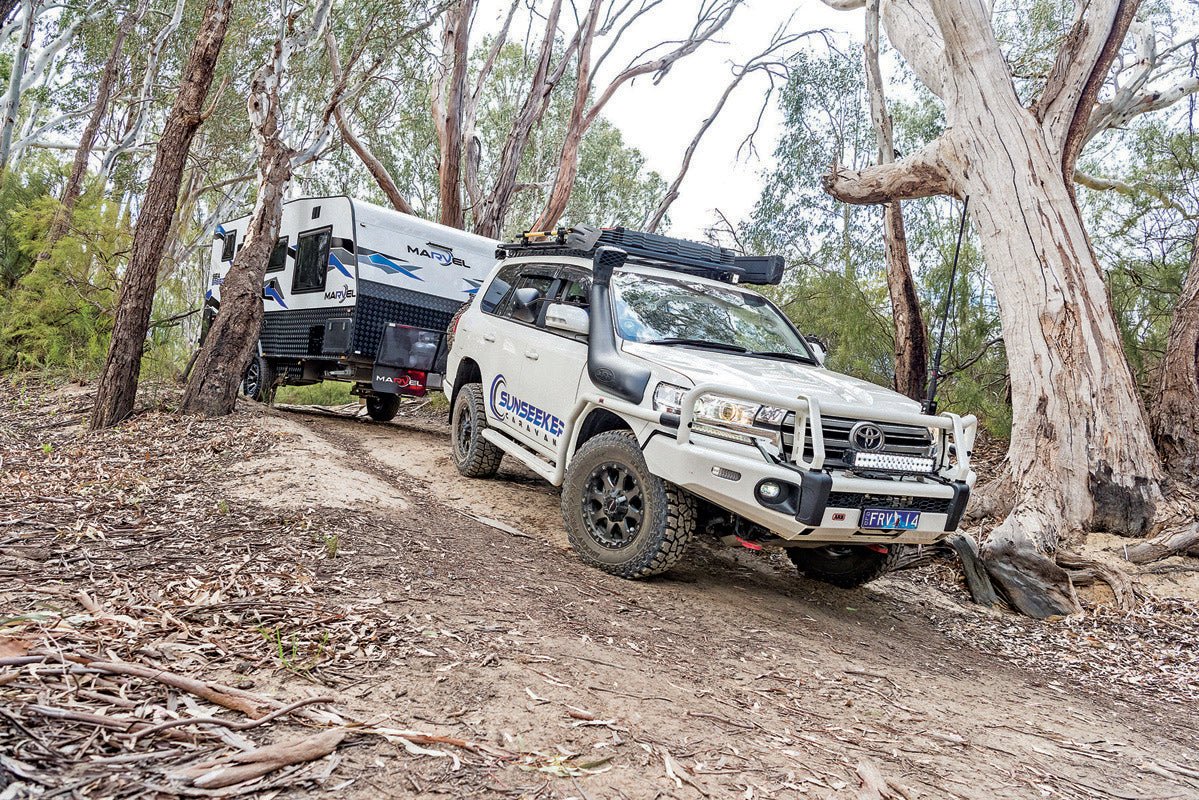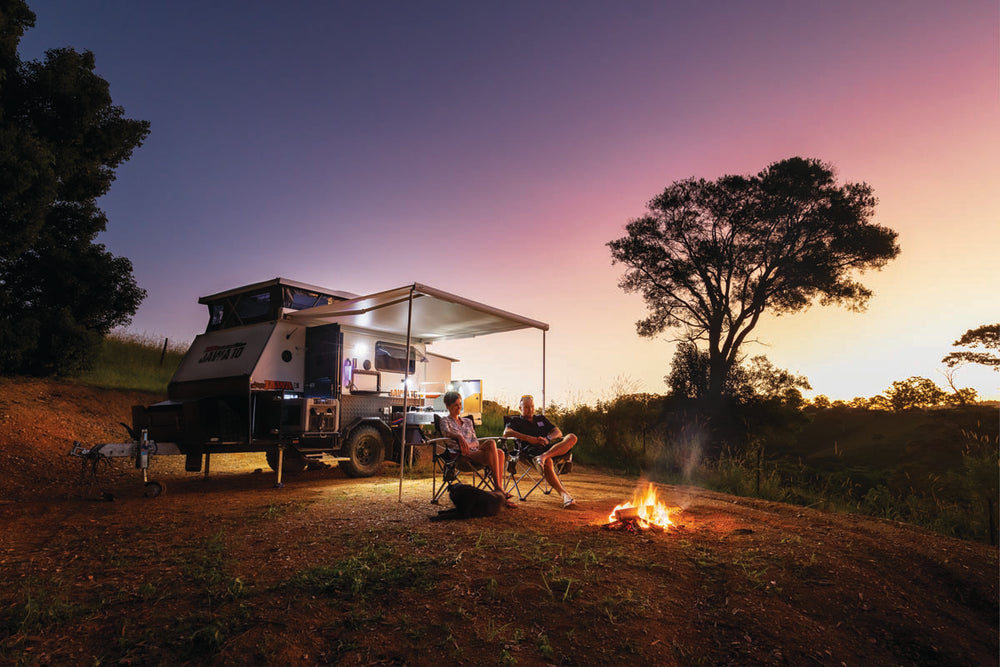Bits and Bobs

One of the fun parts about the RV lifestyle is setting up your rig to perfectly complement the way you’d like to travel. Of course, your RV itself is a major part of that — whether you want to cruise around the country’s caravan parks, head off the edge of the map in search of adventure, or a little bit of both.
But the accessories you choose are also an integral part. Whether it’s small items for your kitchen, camp chairs or more significant investments such as extra fridges, solar panels or lithium batteries, you could literally spend thousands of dollars tricking out your van says Wayne Park, Relationship Manager with finance broker Credit One.
“When it comes to accessories for caravans, you are only limited by the amount of money you have to spend,” he tells Caravan World.
Park works with RV buyers every day who are investing in new or second-hand vans and says there are a few pitfalls when it comes to buying accessories.
Most notably it’s over-spending the budget or buying items caravanners think they need but which end up living lonely lives in the garage instead.
Here, he offers some expert advice for vanners to accessorise with confidence.
WHAT ARE ACCESSORIES?
Accessories for campers, caravans and motorhomes cover a broad section of equipment. Some come as standard with new vans, while older second-hand models will need to have accessories added in order to make your travelling lives more comfortable. Park segregates them into two categories; life sustaining and lifestyle.
The former includes fridges, solar panels, generators, extra batteries and power management systems, hot water services for campers and vans without ensuites, cooking equipment, barbecues and the like, whereas the latter could include portable clotheslines, bike racks, canoes or kayaks, fishing rods, hairdryers for the glampers, and even coffee machines.
The bottom line is that the accessories you need are the ones that will make your life on the road much more enjoyable.
“Everyone will have their own opinion on good and bad accessories, but you are the only one who can work out what you’ll need based on how you want to enjoy the lifestyle,” Park says.
CHOOSE YOUR ADVENTURE
The best way to start researching accessories is to simply consider your RV style, and the kind of travel you will be doing. For example, are you camping without power, do you want to stay off-grid or are you comfortable setting up at a caravan park for short and long-term stays? Broadly speaking, those heading off-grid and free camping will need to be more prepared with their accessories. Travellers need to ensure power supply, power management systems and water usage systems are sufficient, says Park.
“The types of accessories you need depends on the type of camping you are doing and the unit you currently have, whether that’s a caravan, camper trailer or motorhome or even a slide-on camper,” he says.
“Realistically, if you are going to stick to caravan parks you may not need very many accessories. An on-road van has no need for multiple battery systems with onboard electrical management systems and a large bank of solar panels because you will be tapping into an onsite power supply. You’ll have the use of caravan park facilities. If you are going off-grid you need to be more mindful of all the basics of life — power, water and some of the creature comforts like hot water.”
Owners of vans without ensuites and those with camper trailers will often invest in gas hot water systems, external showers or external cooking facilities such as a portable barbecue.
New vans come with a plethora of accessories for the modern traveller, but owners should be across what’s included so they don’t double up and spend more unnecessarily.
“If you are buying new and you’re waiting for it to be delivered, make sure you know what you are getting as part of the package, so you don’t buy something that is already included with the model itself,” he advises.
Those who buy second-hand vans which lack modern conveniences will find the need to upgrade or add their personal touches, but Park says the same rules apply whether it is new or used — only buy what will suit your travelling lifestyle.
AVOID OVER-BUYING
Park says from personal experience it is very easy to overspend on accessories. He and his wife opened their wallets for a multitude of items for their own caravan before they went travelling. And it turns out they should have saved their money.
“When we bought our first caravan we went out and bought all the things we thought we’d need. We loaded it up, and off we went on our first adventure then unloaded three-quarters of the things bought when we returned,” he laughs.
“We’re caravan park folk, yes we are glampers. We took everything except the kitchen sink including a barbecue thinking we would sit outside and cook the barbie, but most parks already have those facilities. So after the first trip we left ours at home and decided we would use the park’s barbecue. Space was a real issue with the caravan and, having two daughters, it was premium for more important stuff — which is still under discussion!”
Park says buyers will often be seduced by great deals for accessories at shows, could load up their trolley in accessory shops or over-order on items included in a new build. And it’s also super-easy to jump the gun on all the bells and whistles considering many buyers are now waiting for longer for new builds thanks to COVID-19.
“Be mindful of getting caught up in the hype of buying stuff that you think you need before actually realising whether it is something that you will use and will be of benefit to you,” he says. “Some accessories will be used once and then left in the garage — so you don’t want to throw money away.”
Park’s best tip is to hold fire on buying all but the bare minimum, then taking your RV for a test run to get a feel for how you intend to use it. Unless, of course, it is an accessory that forms part of the construction.
“Take it to a caravan park locally or somewhere you can set it up from start to finish and consider what you might need,” he says. “Look at the space inside the van and then start adding or purchasing what you think will be most suitable for the way you want to travel.
“The key is to keep it simple and have fun.”
WEIGHT A MINUTE...
Another major consideration when buying accessories is the weight they will add to your RV. It’s every owner’s responsibility to ensure they don’t exceed the legal towing capacity of the van, vehicle or their combined weight, and adding a bunch of heavy items is a sure-fire way to sail close to the wind.
“Make sure you have the load capacity to be able to tow your van legally,” he advises.
“Unfortunately there are a lot of people out there who load up their caravans and camper trailers without even thinking about it and all of a sudden they are overweight, which is not just illegal but could actually end in disaster.”
Park suggests RV owners should consider the little things when it comes to weight in their caravans.
“It can be as simple as your plates — don’t go out and buy crockery plates, buy plastic plates and cups instead,” he says. “Don’t load up your kitchen with heavy items.”
Buyers should also consider their setup time, as a long checklist once you arrive at your campsite can be a drainer. Again, Park says it all comes down to personal preference — an annexe is a great idea for families and those staying at locations for long periods of time but this accessory may not suit a touring couple who don't have the added storage space or weight capabilities. A dining setting that is complex to set up may become tiresome when a simpler set would do the trick.
“You want to limit your setup time as much as you can, but unfortunately some people take so many accessories with them that it takes them a really long time to set up their whole campsite,” he says.
A third factor is storage space. By their very nature RVs have limited storage capacity and it is always best to think about where a particular accessory may be stowed. You should weigh up whether the need you have for it is worth the slice of precious real estate it will occupy.
“Sadly, if there is a cupboard, most people will try to fill it,” Park says. “Travellers should revise their expectations about how many things they actually need to take.”
BUYING SECOND-HAND
Another way to rein in your accessories budget is to purchase second-hand items from other caravanners. Camp chairs, plastic crockery, storage ideas, kids’ toys, tie-down pegs and shade cloths for privacy screens can be found at bargain prices.
However you will need to tread warily when purchasing electrical goods, batteries, solar panels and the like.
Park says many RV owners use accessories that they already own as another way to keep costs down.
“They fill vans with their plastic camping plates and cups, if they have a second kettle or toaster that goes into the van or a second set of pots for the kitchen,” he says. “Of course you are limited by the space you have and what is important to you — it is amazing how quickly caravans fill up with ‘stuff’!”
Interested in climbing aboard the RV bandwagon? Credit One has access to a large number of financiers that can tailor a loan to suit your individual needs. Having flexibility inside the loan to make extra repayments or to terminate the loan early is fast becoming the preferred option for many borrowers while keeping costs down.
The Credit One team has a strong history of getting more people into this great lifestyle with a tailored loan as they deal with industry professionals daily.
For more information about financing your dream or to obtain a pre-approval prior to negotiating with a dealer or private seller, call the Credit One team on 1300 273 348, (07) 3420 7030 or visit creditone.com.au.







